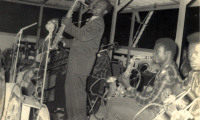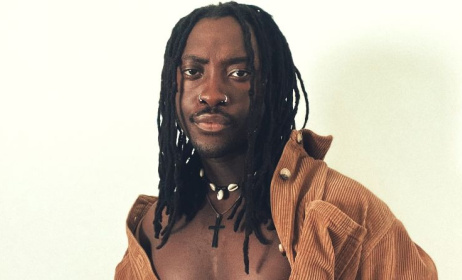Elijah Kitaka: Musicians' attention has shifted to financial planning
The coronavirus (COVID-19) crisis has provided many music professionals a practice run in retirement. With many traditional revenue streams wiped out, artists and various other stakeholders in the music industry now have to think about creative ways of engaging consumers online while forging long-term solutions for an uncertain future.
 Fezah founder Elijah Kitaka says he's seeing much interest in diversification and financial planning and discipline.
Fezah founder Elijah Kitaka says he's seeing much interest in diversification and financial planning and discipline.
We spoke to the founder and executive director of Ugandan tech and entertainment company Fezah, Elijah Kitaka, about what has changed in the industry since the coronavirus began disrupting day-to-day business activities for artists, event bookers and artist managers.
MUSIC IN AFRICA: How has COVID-19 affected Fezah's operations?
ELIJAH KITAKA: Fezah does three things: airplay monitoring, artist bookings and shows. The last two of these typically involve gatherings. With the current lockdown and restrictions on gatherings, artist bookings and traditional shows have been halted. Airplay monitoring has been less impacted; the biggest issue there is the musicians' inability to pay for the service because most are currently not earning an income.
Let's imagine that we knew a few years ago that a crisis of this magnitude was inevitable. What sort of measures do you think music indsutry players should have been put in place?
That is a great question. If we knew that a time was coming when gatherings would not be possible, we would have invested earlier in the infrastructure required for online shows. The infrastructure includes streaming environments, fast Internet to homes or studios, proper billing capability for online streams, a culture of consuming live entertainment online, and effective aggregation platforms for such content. Industries where gatherings were inherently not the norm were ready, a case in point being adult content. On the more innovative side, perhaps we would have paid closer attention to technologies like virtual reality, holograms and more.
What other short- and medium-term strategies should be put in place by creatives in the music sector to ensure continuous flow of income even when they are not on stage?
Other revenue streams are available to those who are ready. They could also consider endorsements, streaming, downloads, merchandising, online influencer campaigns, and so on. These require that an artist has a reasonable scale in terms of audience and brand, but none of them require a physical presence at the time of execution. Artists can also be creative and experiment with their audiences. They could do online hangouts, pay-what-you-can online performances, and other creative ventures. American musician Erykah Badu and a few others have shown a great template for this already.
It has become clear that COVID-19 has created an opportunity for those in the tech space. Does Fezah have plans to explore the production of online concerts?
Yes, we have already invested in a performance-ready, streaming-ready content studio and mobile kit. Unfortunately, we have been slowed down by mobility restrictions but we will pick that up once the lockdown is lifted.
In the meantime, what interventions has Fezah put in place for its artists?
We have five interventions that we announced at the beginning of April. They include a cheaper subscription for our airplay monitoring app, deferred payment for musicians who previously gigged through Fezah and weekly mobile app improvements including a tool that tells musicians which songs they should focus their promotion resources on. There is also the content studio that I've already mentioned, and a weekly online session called #ThinkWithFezah, which helps musicians navigate the industry.
Apart from an explosion in online performances, do you foresee any other changes in the consumption of music content?
Besides online shows, a few live formats that have previously struggled could benefit from an extended but lighter lockdown. Concepts like home concerts or living-room shows could see growth. Virtual reality experiences could see growth as well; we'll see an increase in virtual reality content.
European governments like Germany's continue to issue emergency grants for creatives. Why do you think most African governments do not have systems in place to assists artists and cultural practitioners in times of crisis?
We are neither formalised nor organised. Because we are not formalised, it's very difficult to demonstrate economic impact. This leaves a lot of room for perceptions to carry the day as opposed to hard data. Because we are not organised, it's difficult to engage us as an industry. Which association would you go to that musicians have trust in and that represents the 'industry'? Which union can you look for? These are the two things we need to fix urgently for our industry to be considered seriously in discussions about the economy.
From your interaction with artists, what lessons are they taking from the pandemic?
It's still a bit too early to tell, especially since several restrictions are still active. But the response to the Fezah monitoring app has been great. Between rehearsals, gigs and recording sessions, it's very rare to command the attention of musicians for an extended period. With a lot of that put on hold, we see more attention on tools that can help them understand where they stand and how to move forward. There is also a lot of interest in diversification, financial planning and financial discipline. This is, in fact, one of the topics we plan to cover on the upcoming #ThinkWithFezah sessions.
Any words of encouragement for African creatives during this period?
Stay safe, stay home, but work. Work on your post-COVID-19 strategy, work on your online community, work on understanding data, craft new concepts, work on proposals. Ben Okri, one of my favourite writers, once said: "It's in difficult times that great times ahead are dreamt and built." We should all be focused on the blocks required to build the great times we want to see ahead.
Follow Fezah on Facebook to take be part in the #ThinkWithFezah weekly sessions.



































Comments
Log in or register to post comments